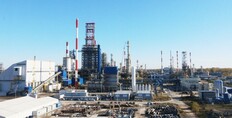- The EFRA Project cost PLN 2.3 billion (€510 mln) and ran from 2015-2019.
- The project will increase production by 900,000 tonnes of high-margin fuels and 300,000 tonnes of coke annually.
- The Delayed Coking Unit uses innovative Triplan technology for air-tight coke processing.
- Employee training included sessions in the US, with 90 LOTOS Asfalt employees gaining new responsibilities.

Project Overview
The EFRA Project at the Gdansk refinery has reached the Ready For Start-Up (RFSU) phase for its Delayed Coking Unit (DCU). This milestone follows extensive testing of 95 systems, ensuring their correct construction and operation. The systems will now be handed over for commissioning by the EFRA Plant, owned by LOTOS Asfalt.
Technological Advancements
The DCU employs globally unique Triplan technology, ensuring fully air-tight processes for unloading and processing coke. This technology meets the highest environmental standards and addresses the common refinery issue of heavy residues from oil processing. The project aims to increase the refinery's output of high-margin products to over 89%, up from 77% in 2012.
Financial Impact
The EFRA Project, costing PLN 2.3 billion (€510 mln) and running from 2015 to 2019, is expected to significantly boost Grupa LOTOS's financial performance. The new Coker Complex will enable the production of an additional 900,000 tonnes of high-margin fuels and 300,000 tonnes of coke annually. The financial benefits should be visible in the company's results for Q4 2019.
Employee Training and Job Creation
The start-up process involves numerous tests prioritizing safety and further training for personnel operating the DCU. Training was partly conducted in the US, familiarizing employees with the new technology. Nearly 90 LOTOS Asfalt employees have new responsibilities, and the construction phase provided jobs for over 1,500 contractor staff, mainly from Polish companies.

